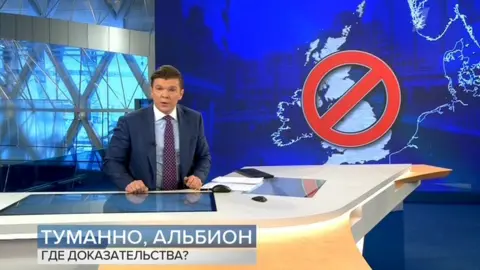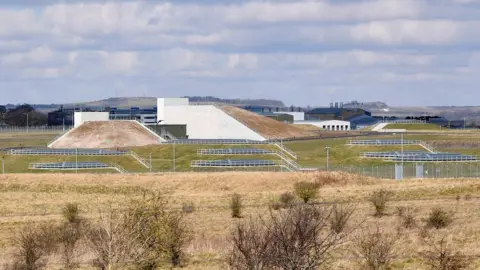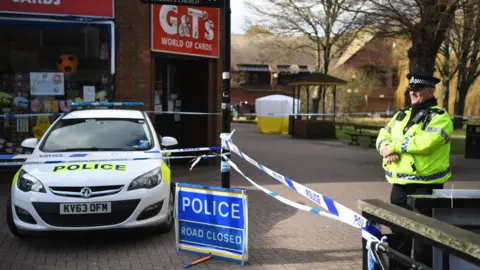Russian spy: State TV anchor warns 'traitors'
 Channel One
Channel OneFor days, Russia's main national TV channels were practically silent on the attempt to kill former spy Sergei Skripal with a nerve agent, but this changed in Wednesday's main evening bulletins.
The comment by Kirill Kleimenov - the presenter on government-controlled Channel One's flagship Vremya news programme - sounded like a veiled, mocking threat to anyone considering becoming a double agent for Britain.
"I don't wish death on anyone, but for purely educational purposes, I have a warning for anyone who dreams of such a career," he said.
"The profession of a traitor is one of the most dangerous in the world," Kleimenov said, adding that few who had chosen it had lived to a ripe old age.
Alcoholism, drug addiction, stress and depression resulting in heart attacks and even suicide were the "professional illnesses of a traitor", according to Kleimenov.
'Maybe it's the climate'
He also had a second piece of advice for such "traitors or those who simply hate their country in their free time": "Don't choose Britain as a place to live."
 Reuters
Reuters"Something is wrong there. Maybe it's the climate, but in recent years there have been too many strange incidents with grave outcomes there."
The remarks stood out from the rest of the evening's coverage, which followed the line often taken by Russian state media in similar circumstances - denial and wry bemusement that anyone should be pointing the finger at Russia.
On NTV - ultimately controlled by state gas company Gazprom - a presenter said the Western media were accusing Russia of poisoning Mr Skripal despite the lack of any evidence or any "expert conclusions".
Its London correspondent, Liza Gerson, mentioned the role of the UK's Porton Down research facility in the investigation, pointing out that it tested chemicals used against German soldiers in World War One.
 NEIL HALL
NEIL HALLShe also took a swipe at Boris Johnson's warning to Russia this week, saying the foreign secretary was known for his "unpredictable antics" and was "an infant in a man's suit".
Over on state channel Rossiya 1, the presenter said the British authorities "didn't even try" to seek Russia's co-operation in the investigation, "but have already discovered a Russian trace in the case".
'Anti-Russian hysteria'
Before the leading TV channels picked up the story, it had been widely covered by newspapers, news websites and niche liberal outlets such as Dozhd TV and Ekho Moskvy radio, as well as the relatively little-watched state news channel Rossiya 24.
"The British media continue to fan anti-Russian hysteria," one Rossiya 24 report said, adding that attempts to find a "Kremlin trace" were based "not on facts, but purely on rumours and fabrication".
The channel's UK correspondent reported the "interesting detail" that Britain's "secret" Porton Down facility manufactures the VX and sarin nerve agents, as well as other "UK weapons of mass destruction".
News websites widely reported remarks by Andrei Lugovoi - a suspect in the killing of former Russian security officer Alexander Litvinenko in London in 2006 - dismissing talk of a "Russian trace".
"The English suffer from phobias," Mr Lugovoi - now a member of the Russian parliament - told the RIA Novosti news agency.
Dozhd TV's take was entirely different from the state media. Here, a presenter said that the discovery that Mr Skripal was poisoned by a nerve agent means "Russia is in for a high-profile criminal investigation".
BBC Monitoring reports and analyses news from TV, radio, web and print media around the world. For more reports from BBC Monitoring, click here. You can follow BBC Monitoring on Twitter and Facebook.
